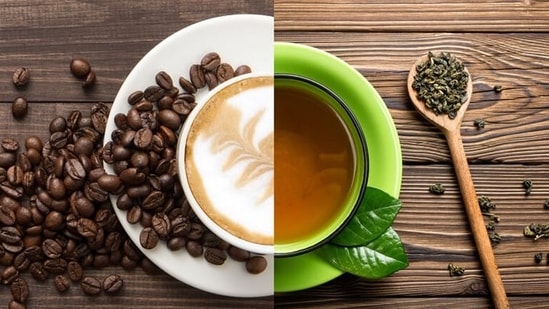
Tea vs coffee, beverage world's great debate: Are tea leaves or coffee beans the better brew for your health?
8 months ago | 79 Views
The story goes that Chinese Emperor Shen Nung first tasted tea as a beverage when he and his soldiers were busy sheltering under a tree and some windblown tea leaves fell into a pot of boiling water, which then infused into it and resulted into today's most consumed drink. First discovered in China in 2737 BC, tea went on to become a staple within Asian culture where it was a symbolic part of religious rituals before it turned into a drink and a medicinal cure.
To compete with China’s tea production monopoly, Britishers first introduced the tea crop commercially in India in 1824 and ever since then, it is grown in bulk across Darjeeling, Nilgiri and Assam with 900,000 tonnes of tea reportedly produced in the country. On the other hand, as the demand for wellness-centric products continues to rise, functional coffee stands out as a delightful and accessible means of fostering a healthier lifestyle where beyond the caffeine jolt, it has become a wellness ally, blending pleasure with purpose in every cup.
Tea vs coffee: Which is better?
In an interview with HT Lifestyle, Dr Subrata Das, HOD - Internal Medicine and Diabetology at Sakra World Hospital in Bengaluru, shared, “Tea and coffee both offer health benefits due to their caffeine and antioxidants, improving energy levels, and mental alertness, and potentially aiding in weight loss. Tea, rich in L-Theanine, is calming and promotes relaxation and hydration, helping with stress reduction and sleep. Coffee, with more caffeine, provides a quick energy boost, enhances physical performance, reduces the risk of chronic diseases like Type 2 diabetes and Alzheimer's, and boosts metabolism.”
He explained, “Coffee has more caffeine than black tea, which can help reduce the risk of chronic diseases, boost athletic performance, and enhance mood and mental alertness. It also increases calorie burning and fat metabolism. Both drinks are rich in antioxidants: coffee contains flavonoids and chlorogenic acid (CGA), which may inhibit fat cell production, while black tea has polyphenols like theaflavins, thearubigins, and catechins, which aid in fat metabolism and can alter gut microbiota for better weight management.”
Dr Subrata Das elaborated, “The antioxidants in both beverages may protect against cancer and heart disease. Coffee provides an immediate energy boost by increasing dopamine levels and blocking adenosine, while tea's L-theanine promotes a calm yet alert mental state by increasing alpha waves in the brain. It is advisable to restrict coffee consumption to 2 cups per day, with a daily caffeine limit of 400mg, roughly equal to 4 cups. Individuals with specific heart conditions, anxiety, or panic disorders should avoid caffeine. Always consult your doctor to decide if caffeine is appropriate for you.”
Bringing her expertise to the same, Dr Rajeshwari Panda, HOD - Nutrition and Dietetics Department at Medicover Hospitals in Navi Mumbai, shared that both coffee and tea offer unique health benefits and the optimal choice often depends on individual preferences and health goals. Let's break down the key points from a nutritionist's perspective -
Common Ground: Antioxidants and Caffeine
- Antioxidants: Both coffee and tea are rich in antioxidants, compounds that protect your cells from damage. These antioxidants contribute to overall health and may reduce the risk of chronic diseases.
- Caffeine: While the caffeine content varies, both beverages provide a natural energy boost. However, excessive caffeine intake can lead to anxiety, insomnia, and digestive issues.
Coffee: The Energizing Elixir
- Potential benefits: Linked to a reduced risk of type 2 diabetes, Parkinson's disease, liver disease, and certain types of cancer. May also improve physical performance.
- Considerations: High caffeine content can be a concern for some individuals. Coffee can also increase acid production in the stomach, potentially aggravating acid reflux.
Tea: The Versatile Brew
- Potential benefits: Rich in polyphenols, a type of antioxidant associated with heart health, reduced inflammation, and lower risk of chronic diseases. Certain teas, like green tea, may aid in weight management and brain function.
- Considerations: The health benefits can vary widely depending on the type of tea. Some herbal teas are caffeine-free, making them a suitable option for those sensitive to caffeine.
Key Factors to Consider
- Caffeine sensitivity: If you're sensitive to caffeine, tea might be a better choice due to its lower caffeine content.
- Health goals: Consider your specific health goals. For example, if you're looking to boost energy levels, coffee might be a good option, while tea could be preferable for relaxation and stress reduction.
- Personal preference: Ultimately, the best beverage is the one you enjoy drinking consistently.
In conclusion, both coffee and tea can be part of a healthy diet when consumed in moderation. It is essential to listen to your body and choose the beverage that aligns with your individual needs and preferences. If you have specific health concerns, consult with a clinical dietitian for personalised guidance.
Read Also: Can dhokla help in weight loss?




















